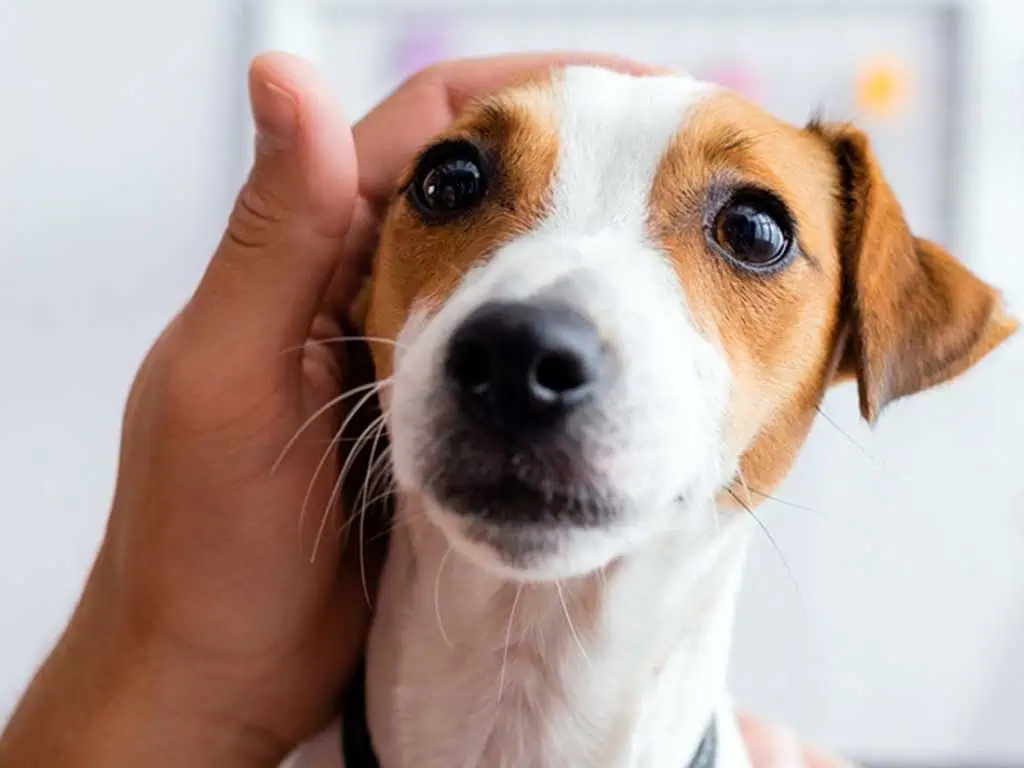
Introduction
Why is my dog pacing and won’t lie down is one of those scary questions pet parents google in the middle of the night. Sometimes it’s normal restlessness; other times it’s a medical red flag. In this guide, you’ll learn the most common reasons dogs pace and refuse to settle, the signs that require urgent care, proven at-home steps to help your dog relax, and how to monitor patterns so you can act early. Research shows pacing can stem from stress and anxiety, pain, digestive trouble, cognitive changes in seniors, and even life-threatening emergencies like bloat (GDV).
Table of Contents
Quick Take: When to Call a Vet Now
- Distended, tight belly; retching without vomiting; panting; won’t lie down → possible bloat (GDV); go to emergency now.
- Sudden pacing with crying, collapse, or breathing trouble when lying down → emergency assessment for pain, heart/respiratory disease.
- Senior dog suddenly pacing at night with confusion → exam for canine cognitive dysfunction; early treatment helps quality of life.
Why Dogs Pace and Refuse to Lie Down
Below are the most likely buckets, with actionable steps. You’ll also see where why is my dog pacing and won’t lie down fits as a symptom in each bucket.
Anxiety and Stress
What you’ll see: pacing, panting, whining, won’t settle, clinging, startle responses. In seniors, stress can blend with cognitive decline.
Why it happens: fear triggers (noises, storms, new environment), separation, or age-related anxiety.
What to do now: create a quiet den, use predictable routines, enrichment before bed, and speak to your vet about behavior meds if needed. Link a calm bedtime with short outdoor breaks and a simple training task. Why is my dog pacing and won’t lie down often improves when triggers are removed and sleep hygiene improves.
Pain or Discomfort
What you’ll see: restlessness, shifting positions, reluctance to lie down, pacing after activity or meals. Pain can be due to joints, abdomen, skin itch, or injury.
Why it happens: arthritis, GI upset, pancreatitis, post-operative pain, or even severe itch.
What to do now: call your vet if pacing is persistent or paired with crying, vomiting, or limping. Do not give human pain meds.
Gastrointestinal Trouble
What you’ll see: nausea (lip-licking, drooling), frequent swallowing, grass-eating, pacing after meals, reluctance to lie down.
Why it happens: dietary indiscretion, gas, mild gastritis—or emergency bloat (GDV) in deep-chested breeds.
What to do now: for mild upset without red flags, offer small, bland meals and water access; monitor closely. If the belly looks enlarged, tight, or your dog retches without producing vomit and won’t lie down, go to ER immediately.
Cognitive Dysfunction in Senior Dogs
What you’ll see: nighttime pacing, confusion, aimless wandering, new accidents indoors, vocalizing.
Why it happens: age-related brain changes (similar to Alzheimer’s).
What to do now: schedule a wellness exam. Vets may use diet, supplements, lifestyle routines, and medications to improve sleep and reduce pacing. Why is my dog pacing and won’t lie down at night is a hallmark symptom in seniors.
Sleep/Wake Disorders
What you’ll see: nighttime pacing, whining, attempts to wake family, daytime sleepiness.
Why it happens: insomnia from anxiety, pain, itch, or cognitive dysfunction.
What to do now: address the root cause (pain control, anti-itch therapy, cognitive support). Keep a consistent bedtime routine and cut late-night heavy meals.
Respiratory or Cardiac Discomfort
What you’ll see: pace/stand to breathe, coughing, faster breathing, restlessness when lying flat. Owners sometimes report “won’t lie down” because it worsens breathing.
What to do now: urgent vet evaluation—breathing difficulty is an emergency. (Owner reports often match this pattern.)
Environmental/Behavioral Factors
What you’ll see: pacing around doors/windows (wildlife outside), boredom, under-exercised dogs “doing laps.”
What to do now: structured exercise, nose work, puzzle feeders, and consistent lights-out habits. Track whether why is my dog pacing and won’t lie down happens on specific days (e.g., after missed walks).
Seven Serious Causes (at a glance)
To keep headings clean (per your no-numbered-headings rule), these are bolded sub-points you can scan quickly:
- Anxiety or acute stress: fireworks, storms, separation, new home.
- Pain (orthopedic or abdominal): arthritis flare, pancreatitis, post-op discomfort.
- Gastrointestinal emergencies: bloat (GDV) with tight belly and retching—ER now.
- Cognitive dysfunction (senior dogs): nighttime pacing, confusion, disorientation.
- Sleep disorders/insomnia: pacing at night, day fatigue.
- Respiratory/heart strain: pacing because lying flat worsens breathing—urgent check.
- Under-stimulation/boredom or outside triggers: pacing at windows/doors.
What To Do Right Now If Your Dog Won’t Lie Down
- Scan for red flags (distended belly, retching, collapse, blue gums). If present, go to the ER.
- Check breathing: count breaths at rest (normal ~15–30/min). If labored or fast at rest, seek urgent care.
- Offer a calm space: lights low, white noise, safe crate/den. Anxiety-based “why is my dog pacing and won’t lie down” often eases when triggers are reduced.
- Leash outside for a brief break to rule out bathroom needs.
- Hold food/water briefly if you suspect nausea or bloat until a vet directs you—don’t induce vomiting.
- Note the pattern: time of day, meals, exercise, noises, meds. A simple journal helps your vet pinpoint causes.
Comparison Table: Common Causes vs Signs vs What to Do
| Likely Cause | Hallmark Signs When They Won’t Lie Down | What You Can Do Tonight | Urgency |
|---|---|---|---|
| Anxiety/Stress | pacing, panting, startled by noises; settles when trigger removed | quiet room, white noise, short sniff-walk, enrichment before bed; follow up with vet for behavior plan | Routine vet if persistent |
| Pain/Discomfort | restlessness, shifting, crying, limping, abdomen guarded | restrict activity, avoid human pain meds, call your vet in the morning | Same-day vet if moderate; urgent if severe |
| GI Upset | drooling, lip-licking, nausea; pacing after meals | small bland meal only if no red flags; monitor closely | ER if distended belly/retching |
| Cognitive Dysfunction | nighttime pacing, confusion, new house-soiling | consistent routine, night lights, brain games; vet for meds/diet | Routine exam; sooner if worsening |
| Sleep Disorder | pacing at night, daytime sleepiness | address root causes (pain/itch/anxiety), keep bedtime routine | Routine exam if ongoing |
| Cardio/Respiratory | can’t get comfy lying flat, cough, fast breathing | keep upright, calm, cool environment | Urgent—breathing signs need vet check |
Home Management That Actually Helps
Bed set-up: orthopedic mattress, raised head option for dogs that breathe easier slightly elevated.
Pre-bed routine: 15–20 minutes of sniffy enrichment, then a calm cue.
Food timing: finish dinner at least 2–3 hours before bed; avoid large, single meals in deep-chested breeds at night.
Gentle monitoring: track nights when why is my dog pacing and won’t lie down spikes; look for noise, weather, missed walks, or guest visits as triggers.
Training: reinforce a “settle” on a mat; reward calm body language.
Discuss vet options: anti-anxiety meds, pain control, GI therapies, and for seniors, cognitive-support diets or meds.
How to Monitor Behavior Patterns Without Hovering
Nighttime pacing often happens when you’re not watching. A smart camera helps you see when pacing starts, what triggers it, and whether your dog eventually lies down. Mention learning patterns with your device—motion tags, two-way audio to reassure, and timeline review in the morning—so you can share specific clips with your vet. If you don’t have one, consider reading our Furbo 360° Dog Camera review for an example of features that help you track restlessness at night.
You can also reinforce your category authority by linking this guide to a related product page in the same “Monitoring & Calming” silo, such as our LuckyTail Dog Nail Grinder review when discussing nighttime grooming routines that reduce discomfort before bed.
Evidence-Based Stress Signs (External Resource)
For an accessible visual refresher on stress body language (pacing, lip-licking, yawning), review the American Kennel Club – How to Tell If Your Dog Is Stressed.
FAQ Why Is My Dog Pacing and Won’t Lie Down
Why is my dog pacing and won’t lie down at night specifically?
Nighttime adds triggers (wind, wildlife, storms) and highlights pain and cognitive dysfunction because distractions are minimal. Sleep disorders and anxiety also peak at night. Track timing, environment, and meals; get a vet exam if it’s frequent.
Is pacing always a sign of pain?
Not always—anxiety and boredom can cause it—but persistent pacing with reluctance to lie down is a classic pain flag. Pairing with crying, panting, or guarding the belly warrants a visit.
Could it be dangerous if my dog won’t lie down after eating?
Yes—watch for bloat (GDV) signs (distended, tight belly; retching; won’t settle). Treat as an emergency.
Do senior dogs pace because of dementia?
Often. Cognitive dysfunction commonly shows up as nighttime pacing, confusion, and new anxiety. Early vet care can improve quality of life.
Final Thoughts
When you catch yourself asking why is my dog pacing and won’t lie down, think like a detective: rule out emergencies, note the pattern, and share details with your vet. Most cases are manageable with a calmer environment, better sleep routines, pain control when needed, and consistent tracking so you can intervene early. If you’re noticing repeat episodes, record short clips overnight and book a checkup—your future self (and your dog) will sleep better.

